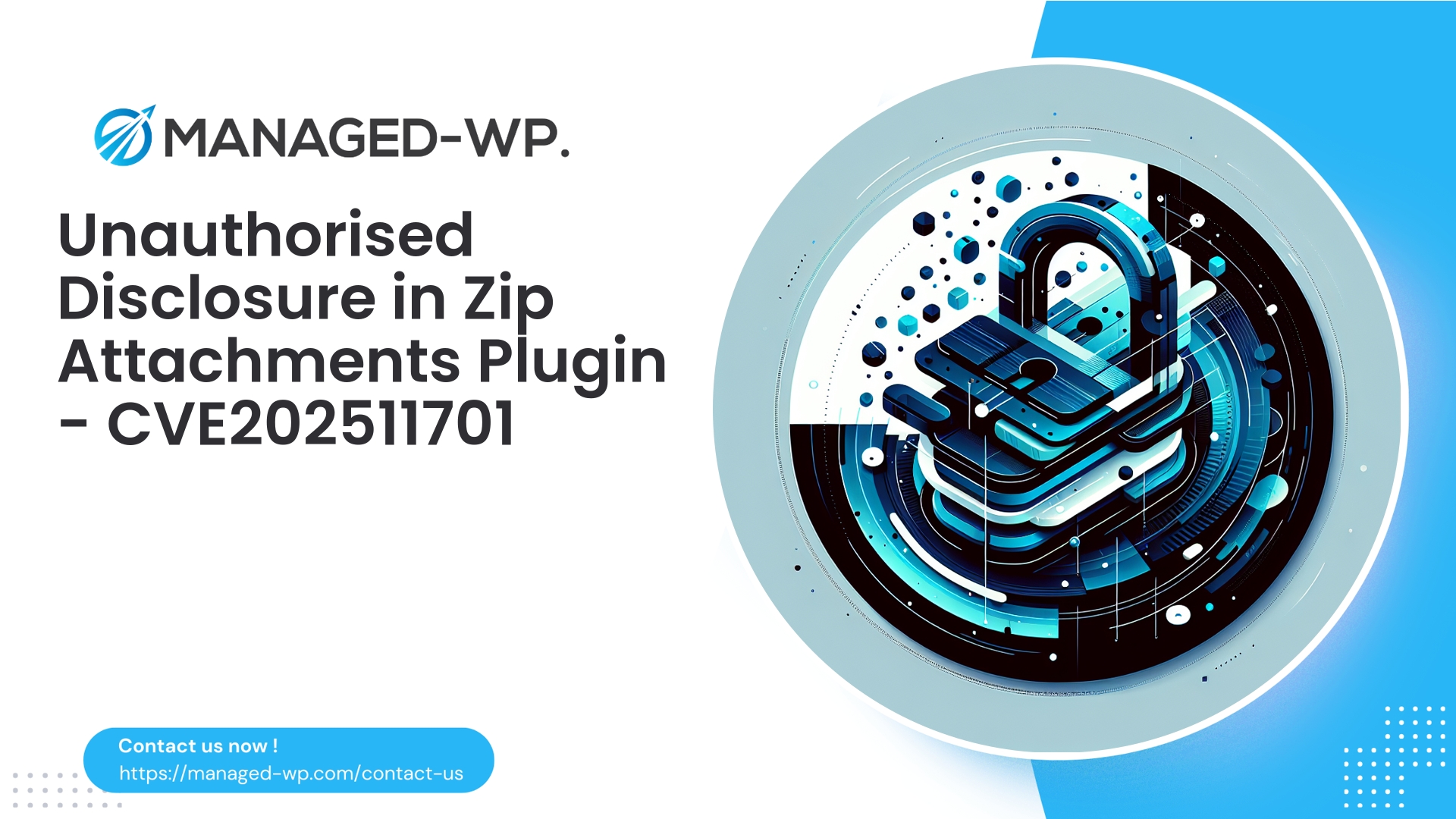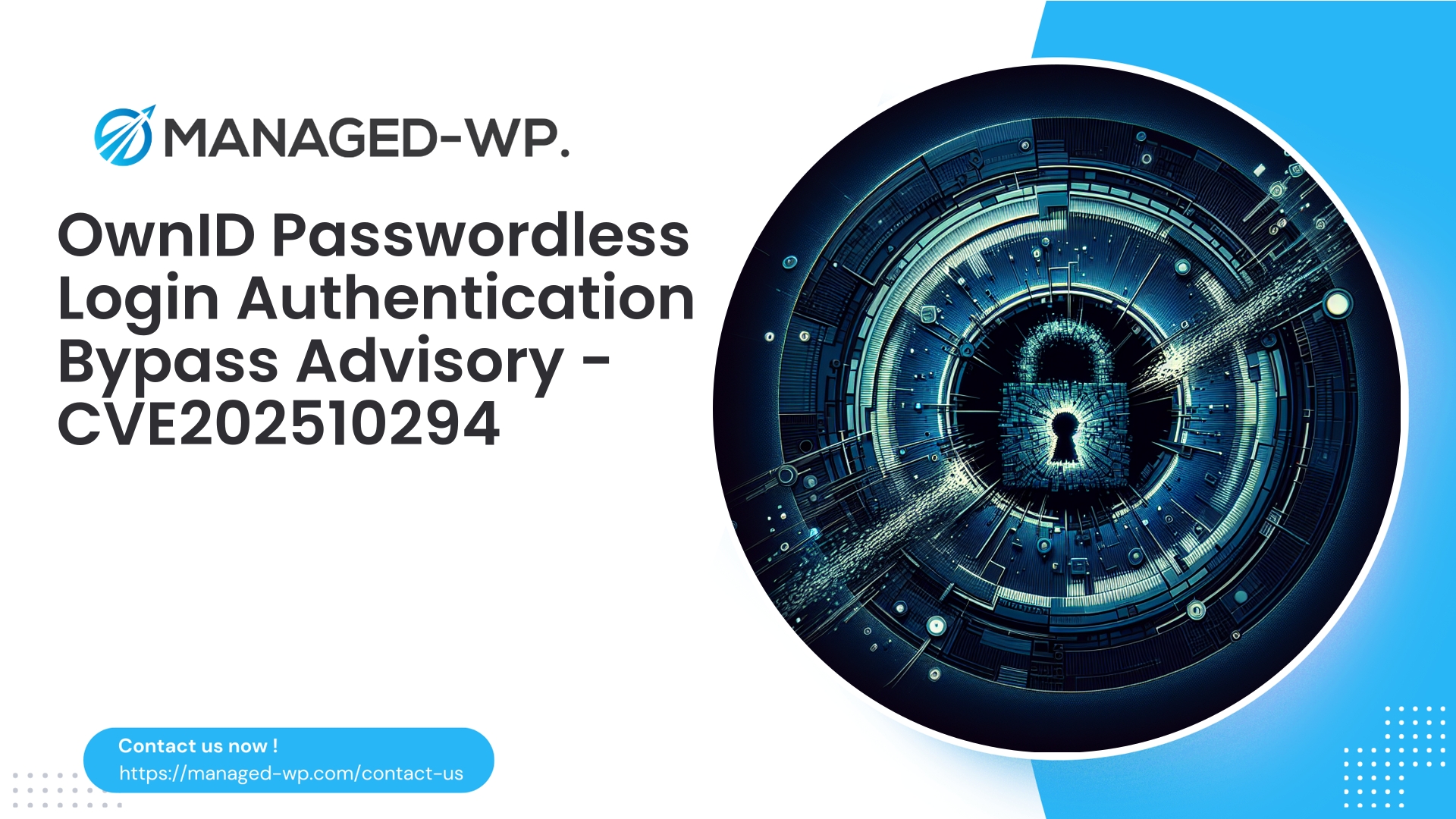| 插件名称 | 拉链附件 |
|---|---|
| 漏洞类型 | 缺少授权 |
| CVE编号 | CVE-2025-11701 |
| 紧急 | 低的 |
| CVE 发布日期 | 2025-10-15 |
| 源网址 | CVE-2025-11701 |
Zip Attachments 插件(≤ 1.6)漏洞:未经身份验证即可访问私有和密码保护的附件 (CVE-2025-11701) — WordPress 网站所有者的重要指南
日期: 2025年10月15日
作者: 托管 WordPress 安全团队
执行摘要
Zip Attachments WordPress 插件(1.6 及更早版本)存在一个严重的安全漏洞,允许未经授权的用户下载链接到私有或密码保护文章的附件。该漏洞源于插件下载机制中存在访问控制缺陷,导致敏感内容在未经身份验证的情况下泄露。该漏洞的 CVE 编号为 CVE-2025-11701,CVSS 基本评分为 5.3,属于低至中等严重级别。
虽然该漏洞的严重性不高,但其对隐私和数据安全的影响却十分显著,尤其对于托管敏感文档、图像或备份的网站而言。本文将详细介绍该漏洞的技术细节、潜在攻击途径、检测方法、紧急缓解措施和推荐修复方案——所有内容均以切实可行的见解为基础,旨在为网站管理员和安全专业人员提供参考。
为什么这对 WordPress 网站所有者很重要
WordPress 通常依赖插件来管理自定义下载功能,例如 AJAX 处理程序或短代码驱动的端点。如果这些功能没有得到妥善保护,可能会无意中泄露私密内容。
尽管CVSS评级为中等,但实际影响很大程度上取决于泄露附件的机密性。这些文件可能包含合同、个人身份信息 (PII)、敏感图像、备份存档或专有数据——一旦泄露,可能导致违反合规性规定、声誉受损,或使攻击者能够开展有针对性的后续欺诈或网络钓鱼活动。
本次简报的目的是:
- 从技术层面分析漏洞,以便做出明智的安全决策。
- 提供您可以快速实施的切实可行的应对措施。
- 为开发人员和高级网站维护人员提供可靠的代码修正方案。
- 为管理员提供检测和事件响应方面的最佳实践。
漏洞技术分析
概括: Zip Attachments 插件提供了一个端点,用于生成和发送与文章关联的附件的 ZIP 压缩包。然而,该处理程序缺少适当的授权验证——具体来说,它在返回文件之前不会确认请求者是否拥有访问私有或密码保护文章的权限。
根本原因: 下载处理程序中缺少或不完整的授权检查,例如未能调用 post_password_required()对私有帖子权限验证不足,或缺乏用户能力评估。
攻击面:
- 公开可访问的 GET 查询参数,例如
/?zip_attachments=download&post_id=123 - AJAX 请求
admin-ajax.php?action=zip_attachments_download&post_id=123 - 自定义插件重写规则暴露下载URL
由于这些端点无需身份验证即可访问,攻击者可以枚举帖子或附件 ID 并检索受限内容。
已识别的CVE: CVE-2025-11701
潜在攻击场景
- 端点发现与枚举:
- 攻击者利用已知的查询参数或 AJAX 操作名称来检测插件端点。
- 它们通过可预测的顺序编号或解析的网站内容来枚举帖子 ID。
- 制作请求触发特定帖子的 ZIP 下载。
- 数据泄露:
- 请求返回文件附件,但未验证访问权限。
- 攻击者会将包含潜在敏感或机密数据的文件存档。
- 泄露的内容可能被用于社会工程或敲诈勒索。
- 连锁攻击:
- 利用公开可访问的内容(网站地图、摘要)来识别有效的帖子 ID。
- 利用窃取的数据进行后续的鱼叉式网络钓鱼或人肉搜索攻击。
复杂: 中等至低——枚举需要端点知识,但不需要身份验证,利用此漏洞不需要其他漏洞(如 XSS)。
立即采取的缓解策略
如果您目前使用的 WordPress 网站安装了 Zip Attachments 插件,并且无法立即升级,请应用以下建议的控制措施来快速降低风险:
- 停用插件 (如可行,建议这样做):
- 进入 WordPress 管理后台 → 插件 → 已安装插件,然后停用“Zip Attachments”插件。
- 这一简单的措施就能立即切断接触途径。
- 通过防火墙或Web应用防火墙阻止易受攻击的端点。:
- 配置您的 Web 应用程序防火墙,拒绝未经身份验证的请求访问与插件相关的 URL。
- ModSecurity 规则示例片段:
SecRule REQUEST_URI "@rx (zip[-_]attachments|zipattachments|zip_download|za_download)" "id:900001,phase:1,deny,log,msg:'阻止未经身份验证的 zip 附件下载',chain" SecRule &REQUEST_HEADERS:Cookie "@eq 0" "t:none"根据您的身份验证 cookie 调整这些规则,例如 WordPress 使用
wordpress_logged_in_. - 限制特定 AJAX 操作:
- 阻止或要求对呼叫进行身份验证
admin-ajax.php?action=zip_attachments_download. - nginx 示例代码片段:
location = /wp-admin/admin-ajax.php { if ($arg_action = "zip_attachments_download") { if ($http_cookie !~* "wordpress_logged_in_") { return 403; } } # 常规 admin-ajax 处理在此 } - 阻止或要求对呼叫进行身份验证
- 应用基于 IP 地址或地理位置的限制 作为敏感环境的临时措施。
- 强制执行随机数或引用来源验证 如果可行,确认请求来自授权的交互式来源。
- 监控日志和警报 异常下载模式或对易受攻击的插件端点的频繁请求。
推荐的虚拟补丁规则
以下是通过WAF或防火墙解决方案部署虚拟补丁的通用模式。请根据需要调整语法:
- 阻止未经认证的用户访问插件目录: 拒绝 HTTP 请求
/wp-content/plugins/zip-attachments/除非经过身份验证。 - 阻止特定的管理员 Ajax 操作: 检测并阻止或质疑请求
操作=zip附件下载如果会话未经身份验证。 - 限制HTTP方法并验证引用标头: 仅允许向下载端点发送 POST 请求(如适用),并要求引用来源与网站域名匹配。
- 检测高频访问: 根据短时间内每个 IP 地址的 ZIP 下载量创建警报,以识别滥用行为。
ModSecurity 伪规则示例:
安全规则 REQUEST_METHOD "GET" "chain,deny,msg:'拒绝匿名 zip 附件 GET 请求'" 安全规则 REQUEST_URI "@contains zip-attachments" "chain" 安全规则 TX:AUTHENTICATED "!@eq 1"
笔记: TX:已验证 是身份验证检测的占位符,通常用于检查 WordPress 登录 cookie 是否存在。
为避免误报,在强制执行拒绝规则之前,务必先在监控模式下测试规则。
开发者指南:安全代码修复
插件开发者和高级网站维护人员应在下载处理程序的入口点强制执行全面的授权。这包括:
- 检查
post_password_required()并验证已发布的密码(如适用)。 - 核实
current_user_can('read_post', $post_id)确认用户对私密帖子的访问权限。 - 验证请求的附件是否属于指定的帖子,以防止任意文件下载。
- 使用 nonce 对状态改变或敏感操作进行请求验证。
示例 PHP 代码片段(带注释):
'Post not found' ], 404 ); exit; } // 检查文章是否受密码保护 if ( post_password_required( $post ) ) { if ( ! isset($_POST['post_password']) || $_POST['post_password'] !== $post->post_password ) { wp_send_json_error( [ 'message' => 'Password required' ], 403 ); exit; } } // 验证文章是否为私有以及当前用户是否拥有权限 if ( 'private' === get_post_status( $post ) ) { if ( ! current_user_can( 'read_post', $post_id ) ) { wp_send_json_error( [ 'message' => 'Permission denied' ], 403 ); exit; } } // 附加检查:确认附件属于 $post_id // ... 现有附件验证 ... // 继续构建并流式传输 ZIP 归档文件 ?>
笔记:
post_password_required()正确处理密码访问逻辑。current_user_can('read_post', $post_id)调用 WordPress 的功能映射来验证每篇文章的访问权限。- 切勿仅依赖 HTTP 引用页进行授权检查。
检测:如何确定您的网站是否遭到攻击
- 检查 Web/WAF 日志
- 查找针对已知 Zip 附件 URL 或 AJAX 操作的请求。
- 检查来自未经身份验证的 IP 地址的成功下载(HTTP 200)。
- 分析对受保护帖子的访问权限
- 识别对私密或密码保护的帖子附件的异常请求。
- 评论插件下载记录
- 如果插件记录了下载日志,请按日期关联可疑活动。
- 检查网络和出站流量日志
- 查找是否存在大量或重复的数据传输,这表明可能存在数据泄露。
- 验证文件完整性和存在性
- 检查预期的敏感附件是否缺失或被修改。
确认漏洞利用后应触发事件响应。
事件响应建议
- 遏制
- 立即停用 Zip Attachments 插件或强制执行 WAF 规则以阻止匿名访问。
- 轮换处理通过附件泄露的任何凭证或敏感信息。
- 评估
- 确定受影响的附件、帖子以及未经授权访问的时间范围。
- 根据数据敏感性(PII、财务数据、合同)确定影响的优先顺序。
- 根除与恢复
- 删除或替换已泄露的文件和机密信息。
- 必要时,从干净的备份中恢复数据。
- 通知
- 告知受影响的用户或利益相关者个人或敏感数据泄露的情况。
- 酌情与合作伙伴或客户分享相关的、非敏感信息。
- 事故后改进
- 加强日志记录和监控措施。
- 审查插件管理策略和供应商响应速度。
- 实施虚拟补丁或托管防火墙,以提供更广泛的设备保护。
长期安全最佳实践
- 安装前请彻底审查插件
- 审查插件源代码、更新历史和用户反馈,以确保维护质量。
- 最小化攻击面
- 停用并卸载不常用的插件,以减少潜在的安全漏洞。
- 应用最小权限原则
- 避免将敏感附件存储在 WordPress 的公开上传目录中。
- 考虑使用受保护的存储解决方案,例如带有签名 URL 或专用访问控制层的 AWS S3。
- 实施纵深防御
- 使用托管防火墙和 WAF 在发现漏洞时立即进行虚拟修补。
- 定期备份数据并制定正式的事件响应计划。
- 设置主动监控
- 创建警报,提醒用户注意异常下载活动或私有内容访问量的激增。
检测特征和警告信号
- 来自单个 IP 地址的对包含特定 URL 的请求激增
拉链附件. admin-ajax.php可疑的请求操作=zip_attachments*来自未经认证来源的参数。- 顺序请求或批量请求
post_id或者attachment_id查询参数。 - 对于没有经过身份验证的会话 cookie 的下载请求,返回 200 OK 响应。
- 文件下载过程中出现可疑的用户代理字符串。
这些模式可以作为触发器在 SIEM、WAF 或日志管理平台中实现。
在等待官方修复期间,虚拟修补的价值
- 虚拟补丁可在网络或应用程序防火墙级别提供即时保护,无需等待插件更新。
- 它能在不禁用整个插件的情况下隔离易受攻击的功能,从而保留网站的其他功能。
- 规则通常会随着官方厂商更新的发布而进行完善或禁用。
Managed-WP 的方法强调快速检测、精确的目标规则来阻止未经身份验证的访问,以及从监控到强制阻止的逐步部署。
Managed-WP 如何保护您的网站(概述)
- 自动检测与已知易受攻击插件签名匹配的请求。
- 部署预置的 WAF 规则,阻止未经授权的 ZIP 附件下载。
- 支持隔离模式和实时管理员警报。
- 维护全面的日志,用于事后取证。
使用 Managed-WP 进行端点保护的客户可以激活“Zip 附件 — 缺少授权”虚拟补丁,以便在准备插件更新或替代解决方案时立即降低风险。
网站管理员建议行动时间表
立即(数小时内)
- 如果可以,请停用 Zip Attachments 插件。
- 如果停用插件不可行,则实施 WAF 规则以阻止未经身份验证的访问插件端点。
- 开始检查日志,查找异常或未经授权的下载。
短期(24至72小时)
- 官方插件更新发布后,请立即安装。
- 轮换附件中发现的任何暴露的敏感凭证或密钥。
- 如果敏感数据遭到泄露,请通知相关利益攸关方。
中期(1至4周)
- 检查您对 Zip Attachments 插件的使用情况;如果维护或安全措施不足,请考虑其他替代方案。
- 确保敏感文件安全存储,并采取适当的访问控制措施。
- 持续监控文件访问并发出WAF警报。
长期
- 建立健全的插件审核流程。
- 将虚拟补丁集成到现有的安全工作流程中,以便快速缓解新的插件漏洞。
开发者补丁和拉取请求建议
- 实现单元测试,验证下载端点的授权情况。
- 添加明确的服务器端检查:
post_password_required()强制执行密码保护。current_user_can('read_post', $post_id)确认用户权限。- 在插件 README 文件中明确记录预期行为,特别是关于私有和密码保护内容下载方面。
- 允许网站管理员选择启用匿名下载,默认情况下仅限已验证用户下载以确保安全。
利用托管防火墙和虚拟补丁增强保护
为了保护 WordPress 环境免受此类漏洞和许多常见插件问题的侵害,我们建议使用具有虚拟修补功能的托管防火墙。
- 快速部署针对已知插件漏洞的规则。
- 持续监控并发出可疑活动警报。
- 集成恶意软件扫描和OWASP十大网络风险缓解措施。
以下是 Managed-WP 提供的免费服务概览,供您立即评估。
立即开始使用 Managed-WP 免费计划
使用 Managed-WP Basic(免费)计划快速部署必要的保护措施,包括:
- 防火墙和WAF规则涵盖常见的易受攻击插件入口点。
- 无限带宽,不影响网站可用性。
- 内置恶意软件扫描功能,可检测可疑文件。
- 针对 OWASP Top 10 安全风险的缓解工具。
立即激活并部署虚拟补丁,以应对 CVE-2025-11701 等漏洞: https://my.wp-firewall.com/buy/wp-firewall-free-plan/
对于自动清除恶意软件、IP 黑名单、详细报告或多站点管理等高级需求,请考虑使用 Managed-WP 标准版或专业版套餐。
总结及建议的后续步骤
- 如果您正在使用 Zip Attachments 插件,请立即采取行动:停用该插件、强制执行有针对性的 WAF 规则或实施上述授权检查。
- 建立一套机制,通过可信的邮件列表或安全服务来监控 WordPress 插件漏洞披露情况。
- 将高度机密的文件存储在公共 WordPress 上传目录之外,并使用身份验证或签名 URL 机制进行保护。
- 如果您怀疑存在漏洞利用活动,请遵循概述的事件响应框架:遏制、评估、恢复和沟通。
Managed-WP 专家可协助网站所有者安全高效地部署虚拟补丁和定制的 WAF 规则——无论是单站点还是多站点环境,都是理想之选。
保持警惕,并尽可能限制对自定义下载端点的匿名访问。
参考资料及其他资源
- CVE-2025-11701 官方 CVE 记录
- WordPress开发者文档
post_password_required(),当前用户可以(), 和获取帖子状态()
(帖子结束)



















